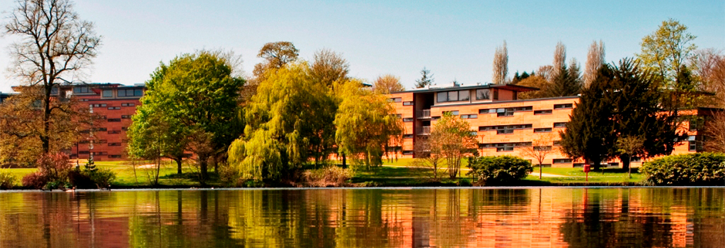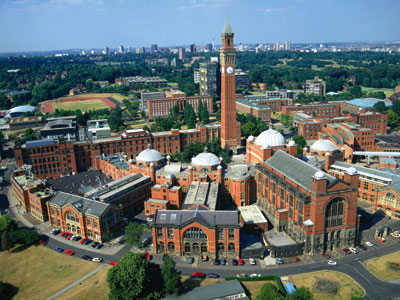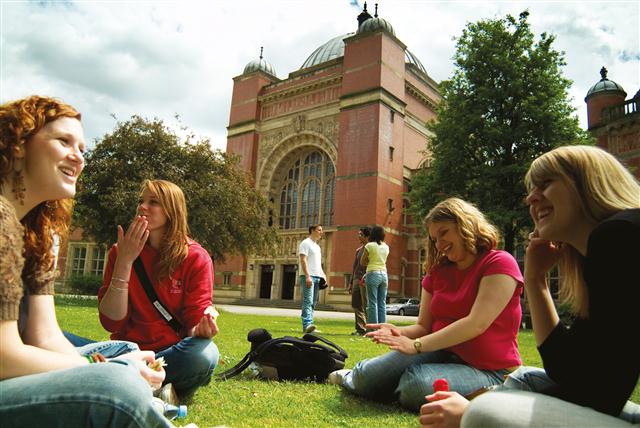Birmingham has been challenging and developing great minds for more than a century. Characterised by a tradition of innovation, research at the University has broken new ground, pushed forward the boundaries of knowledge and made an impact on people’s lives.
We continue this tradition today and have ambitions for a future that will embed our work and recognition of the Birmingham name on the international stage.
Universities are never complete. They develop as new challenges and opportunities occur. At Birmingham we innovate, we push the frontiers of understanding; we ask new research questions, we turn theory through experiment into practice – because that’s what great universities do.
The University grew out of the radical vision of our first Chancellor, Joseph Chamberlain. Founded in 1900, Birmingham represented a new model for higher education. This was England’s first civic university, where students from all religions and backgrounds were accepted on an equal basis.
Birmingham has continued to be a university unafraid to do things a little differently, and in response to the challenges of the day. It was a founder member of the National Union of Students and the first university in the country to:
The University of Birmingham was established by Queen Victoria by Royal Charter in 1900 and was the UK’s first civic or 'redbrick' university. The first phase of building work on the campus was completed in 1909 under the auspices of the esteemed architect Sir Aston Webb. We celebrated the centenary of those buildings in July 2009.
We want our students to profit from Birmingham’s culture of learning and its ethos of critical enquiry, debate and self-motivation. We will encourage and support them to engage with complex, challenging 21st-century issues.
We encourage our students to choose a field of study about which they can be passionate. In partnership with academic supervisors, students acquire skills that enable them to move successfully into the competitive graduate employment sector and to flourish professionally.
Enquiry-based learning is an approach in which learning is driven by a process of enquiry shared with the student. Depending upon the level and the discipline, it can encompass problem-based learning, evidence-based learning, small scale investigations, field work, projects and research.
Enquiry-based learning enables students to take control of their learning as they progress through their degree programme. It encourages them to acquire essential skills for today’s highly competitive graduate employment sector. Such skills are central to
the personal development of our graduates, enriching their capacity for lifelong learning.
Arts and Law (English, Drama and American & Canadian Studies; History and Cultures; Languages, Cultures, Art History and Music; Birmingham Law School; Philosophy, Theology and Religion)
Engineering and Physical Sciences (Chemistry; Chemical Engineering; Civil Engineering; Computer Science; Electronic, Electrical and Computer Engineering; Mathematics; Mechanical Engineering; Metallurgy and Materials; Physics and Astronomy)
Life and Environmental Sciences (Biosciences; Geography, Earth and Environmental Sciences; Psychology; Sport and Exercise Sciences)
Medical and Dental Sciences (Cancer Sciences; Clinical and Experimental Medicine; Dentistry; Health and Population Sciences; Immunity and Infection)
Social Sciences (Birmingham Business School; Education; Government and Society; Social Policy)
Liberal Arts and Sciences
|
|
IELTS* |
TOEFL IBT |
Pearson Test of English (PTE)** |
|---|---|---|---|
| Group A | 6.0 overall with no less than 5.5 in any band | 82 overall with no less than 19 in Reading, 19 in Listening, 21 in Speaking, 19 in Writing | PTE 51 in all four skills |
| Group B | 6.5 overall with no less than 6.0 in any band | 88 overall with no less than 21 in Reading, 20 in Listening, 22 in Speaking, 21 in Writing | PTE 59 in all four skills |
| Group C | 7.0 overall with no less than 6.5 in any band | 95 overall with no less than 22 in any band | PTE 67 in all four skills |
| Group D | 7.0 overall with no less than 7.0 in any band | 95 overall with no less than 23 in any band | PTE 67 in all four skills |
| Group A | Group B | Group C |
| Biosciences | Business, including Economics | Dental Hygiene and Therapy |
| Biomedical Materials Science | Education | Law |
| Chemistry | English, Drama and American and Canadian Studies | Nursing |
| Chemical Engineering | History and Cultures | Physiotherapy |
| Computer Science | Language, Cultures, Art History and Music | Social Work |
| Electronic, Electrical and Computer Engineering | Medical Science BMedSc | Group D |
| Geography, Earth and Environmental Sciences | Philosophy, Theology and Religion | Dentistry (BDS) |
| Mathematics | Political Science and International Relations | Medicine (MBChB) |
| Mechanical Engineering | Psychology | Pharmacy |
| Metallurgy and Materials | Social Policy | |
| Physics and Astronomy | Sociology | |
| Urban and Regional Studies | Sport, Exercise and Rehabilitation Scienc |
For detailed information please contact university.
| Fee band | Undergraduate | Postgraduate research |
Postgraduate taught |
|---|---|---|---|
| Band A (clinical) | £29,085 | £29,085 | n/a |
| Band B (laboratory) | £16,565 | £16,230 | £17,355 |
| Band C | £13,855 | £13,855 | £15,525 |
| Band D | £12,565 | £12,565 | £13,665 |



2014 © a2fairs. All Rights Reserved. powered by twopulse.com